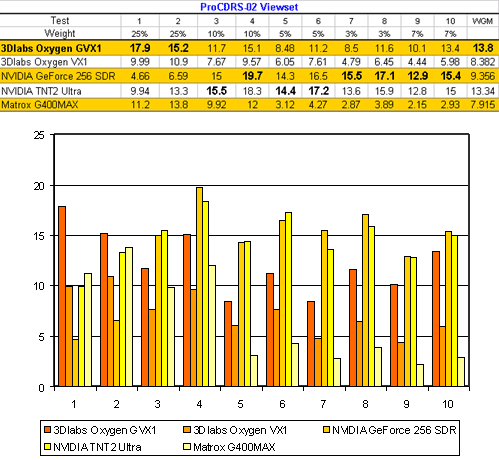ProCDRS-02 Viewset
Taken from: http://www.spec.org/gpc/opc.static/procdrs.htm
The ProCDRS-02 viewset is a complete update of the CDRS-03 viewset. It is intended to model the graphics performance of Parametric Technology Corporation's CDRS industrial design software.
For more information on CDRS, see http://www.ptc.com/icem/products/cdrs/cdrs.htm
The viewset consists of ten tests, each of which represents a different mode of operation within CDRS. Two of the tests use a wireframe model, and the other tests use a shaded model. Each test returns a result in frames per second, and a composite score is calculated as a weighted geometric mean of the individual test results. The tests are weighted to represent the typical proportion of time a user would spend in each mode.
All tests run in display list mode. The wireframe tests use anti-aliased lines, since these are the default in CDRS. The shaded tests use one infinite light and two-sided lighting. The texture is a 512 by 512 pixel 24-bit color image. See the script files for more information.
Test Weight Description 1 25 Wireframe test 2 25 Wireframe test, walkthrough 3 10 Shaded test 4 10 Shaded test, walkthrough 5 5 Shaded with texture 6 5 Shaded with texture, walkthrough 7 3 Shaded with texture, eye linear texgen (dynamic reflections) 8 3 Shaded with texture, eye linear texgen, walkthrough 9 7 Shaded with color per vertex 10 7 Shaded with color per vertex, walkthrough

Here is where the GeForce runs into problems and where 3Dlabs' 15 years of driver experience truly begins to shine. For whatever reason, the GeForce does not seem to like the first two tests, both of which are wireframe tests. But we've run wireframe tests before, why all of the sudden does the GeForce start performing below par? What's different in this viewset is that the two wireframe tests use Anti Aliased lines which the GeForce seems to have trouble doing for some reason.
The cause of this could be software related, but the TNT2 was using the same driver set as the GeForce and no AA problem emerged in those tests at all. We are leaning towards an issue with the GeForce's hardware and the current driver release, which is possibly why we have yet to see a fix for the problem. Now keep in mind that the GeForce is still a gamer's card, and NVIDIA does have a professional version of the GeForce known as the Quadro. The Quadro features a slightly higher clock speed than the GeForce and drivers that are tailored to professional applications, which should make competitiors in the workstation graphics arena worried. Initial tests indicate that the Quadro does not have this AA problem, but at the same time keep in mind that the Quadro will easily be priced at the same level as the GVX1 (~$600).
The GVX1 performs quite nicely here, and gains the lead over the competition courtesy of its speedy wireframe AA rendering as well as its relatively strong performance throughout the rest of the tests. With the two wireframe AA tests accounting for half of the final weighted geometric mean, it is not a surprise that the GVX1 comes out on top.











3 Comments
View All Comments
evilpaul666 - Wednesday, October 14, 2020 - link
First!Railgun - Thursday, October 15, 2020 - link
Welp, if we’re going to be children...First is worst. Second’s best.
domboy - Thursday, October 15, 2020 - link
Reading this all these years later I realize several things. I miss- single slot cards
- having more than just two gpu vendors
- video cards with green PCBs
Good old PCI bus. I don't miss AGP though... glad PCIe came along to to allow one standard for all add-on cards.